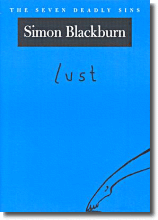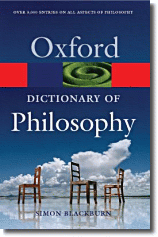Regular readers of the blog will be aware of the high regard I have for his work: here I reviewed his book Lust, and here I took the liberty of subjecting it to "the page 69 test." And here I wrote that while an excerpt from his most recent book Plato's Republic: A Biography does not make me any more confident that I understand Plato, it does make it clearer why I've long been befuddled by the ancient.
All of which is to say I was honored and delighted that he agreed to subject his 2005 book Truth: A Guide (2005) to the "page 69 test." Here is his response:
In the passage of my book which is being discussed, I reflect on the heat that the ‘science wars’ generated. The point of the discussion is to show that ‘relativism’, which is often thought of as a kind of happy-clappy, open-minded, doctrine of tolerations, can actually appearMany thanks to Simon for the input.very demeaning and threatening. This happens when the investigator, in this case the practising scientist, is regarded in a purely sociological spirit, that is, bracketing or putting to one side any claim he has to be investigating the fact of the matter. Whether or not it was intended to do this the so-called ‘symmetry thesis’ of the ‘strong program’ in the philosophy of science was read as doing just this, and of course working scientists were insulted and felt belittled by it. I make the comparison with someone conscientiously navigating a ship, using charts and tide tables, but whose use of these things is then regarded as mumbo-jumbo, or indicative of gender or class or some other dark force working in the background. This is emphatically not to deny that money, power, and prestige have their influence (think of the distortion of effort in the pharmaceutical industry, away from the actual disease burden of the world towards the more lucrative goal of providing expensive comforts for people in the first world). But it does imply that there is a difference between going about things in ways designed to find truths, and not doing so. The aim of finding out how things stand imposes a goal, and it is up to our intelligence to find out how to set about hitting it. Man may be the measure of all things, but he has to be careful how he measures them, just as the navigator has to be skilled and careful with his charts and tide tables.
For a brief excerpt from the book, click here.
Click here for a NPR segment of Blackburn discussing Truth; there is also an excerpt at the site. To listen to a group discussion on Truth (and "truth") with Blackburn, Stanley Fish, Michael Lynch, and Michael Massing, click here.

Click here for reviews of Truth, and here for the Table of Contents.
Among the praise:
"The pleasure of reading this beautifully written and crafted book is almost sensual, so complete does each sentence seem in its witty unfolding. Blackburn takes up the knottiest philosophical issues--truth, justice, belief, evidence, interpretation--and without dissolving the knots he carefully undoes them, and then, in some cases, reties them. A wonderful embracing tour through the minefield of philosophical controversy that will inform the novice and delight the afficionado."--Stanley FishJim Holt discussed Truth and two other books in this interesting New Yorker review.
Blackburn's other books include Reason and Prediction (1973), Spreading the Word (1984), Essays in Quasi-Realism (1993), The Oxford Dictionary of Philosophy (1994), Ruling Passi
 ons (1998), Think (1999), Being Good (2001), Lust (2004), and most recently Plato’s Republic (2006).
ons (1998), Think (1999), Being Good (2001), Lust (2004), and most recently Plato’s Republic (2006).Click here to read a conversation between Simon Blackburn and Peter Momtchiloff, Commissioning Editor for Philosophy at Oxford University Press.
Several of Blackburn's reviews and other essays are available here. One of my favorites is his explication of Truth and Predication by Donald Davidson, a philosopher whose work I used to read with great interest. The review contains this gem of a passage:
Philosophers think of themselves as the guardians of reason, intent beyond other men upon care and accuracy, on following the argument wherever it leads, spotting flaws, rejecting fallacies, insisting on standards. This is how we justify ourselves as educators, and as respectable voices within the academy, or even in public life. But there is a yawning chasm between self-image and practice, and in fact it is a great mistake to think that philosophers ever gainPrevious "page 69 tests":their followings by means of compelling arguments. The truth is the reverse, that when the historical moment is right people fall in love with the conclusions, and any blemish in the argument is quickly forgiven: the most outright fallacy becomes beatified as a bold and imaginative train of thought, obscurity actually befits a deep original exploration of dim and unfamiliar interconnexions, arguments that nobody can follow at all become a brilliant roller-coaster ride towards a shift in the vocabulary, a reformulation of the problem space. Follow the star, and the raw edges will easily be tidied up later.
Brian Freeman, Stripped
Alyson M. Cole, The Cult of True Victimhood
Jeff Biggers, In the Sierra Madre
Jeff Broadwater, George Mason, Forgotten Founder
Alicia Steimberg, Andrea Labinger (trans.), The Rainforest
Michael Grunwald, The Swamp
Darrin McMahon, Happiness: A History
Leo Braudy, From Chivalry to Terrorism
David Nasaw, Andrew Carnegie
Leah Hager Cohen, Train Go Sorry
Chris Grabenstein, Slay Ride
David Helvarg, Blue Frontier
Marina Warner, Phantasmagoria
Bill Crider, A Mammoth Murder
Robert W. Bennett, Taming the Electoral College
Nicholas Stern et al, Stern Review Report
Kerry Emanuel, Divine Wind
Adam Langer, The Washington Story
Michael Scott Moore, Too Much of Nothing
Frank Schaeffer, Baby Jack
Wyn Cooper, Postcards from the Interior
Ivan Goncharov, Oblomov
Maureen Ogle, Ambitious Brew
Cass Sunstein, Infotopia
Paul W. Kahn, Out of Eden
Paul Lewis, Cracking Up
Pagan Kennedy, Confessions of a Memory Eater
David Greenberg, Nixon's Shadow
Duane Swierczynski, The Wheelman
George Levine, Darwin Loves You
John Barlow, Intoxicated
Alicia Steimberg, The Rainforest
Alan Wolfe, Does American Democracy Still Work?
John Dickerson, On Her Trail
Marcus Sakey, The Blade Itself
Randy Boyagoda, Governor of the Northern Province
John Gittings, The Changing Face of China
Rachel Kadish, Tolstoy Lied
Eric Rauchway, Blessed Among Nations
Tim Brookes, Guitar and other books
Ruth Padel, Tigers in Red Weather
William Haywood Henderson, Augusta Locke
Jed Horne, Breach of Faith
Robert Greer, The Fourth Perspective
David Plotz, The Genius Factory
Michael Allen Dymmoch, White Tiger
Patrick Thaddeus Jackson, Civilizing the Enemy
Tom Lutz, Doing Nothing
Libby Fischer Hellmann, A Shot To Die For
Nelson Algren, The Man With the Golden Arm
Bob Harris, Prisoner of Trebekistan
Elaine Flinn, Deadly Collection
Louise Welsh, The Bullet Trick
Gregg Hurwitz, Last Shot
Martha Powers, Death Angel
N.M. Kelby, Whale Season
Mario Acevedo, The Nymphos of Rocky Flats
Dominic Smith, The Mercury Visions of Louis Daguerre
Simon Blackburn, Lust
Linda L. Richards, Calculated Loss
Kevin Guilfoile, Cast of Shadows
Ronlyn Domingue, The Mercy of Thin Air
Shari Caudron, Who Are You People?
Marisha Pessl, Special Topics in Calamity Physics
John Sutherland, How to Read a Novel
Steven Miles, Oath Betrayed
Alan Brown, Audrey Hepburn's Neck
Richard Dawkins, The Ancestor's Tale
--Marshal Zeringue





